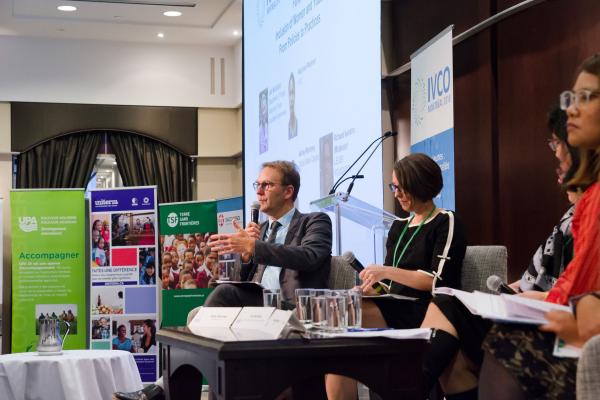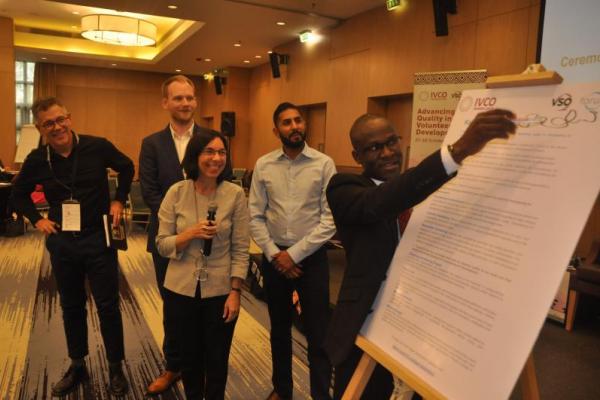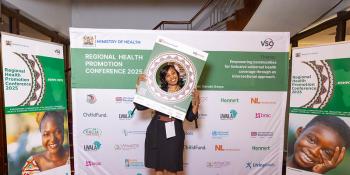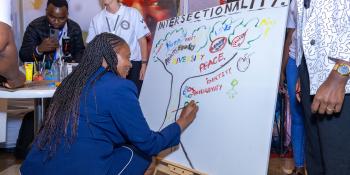At the end of last year, VSO was proud to play a leading role in launching the revised version of the Global Standard for the Volunteering for Development Sector, through our partnership with the International Forum for Volunteering in Development.
Every year, over a billion people around the world volunteer their time to support communities and make a difference - from the volunteers distributing food after natural disasters to those mentoring girls to stay in school, volunteers are a unique and powerful force in development and contributing to the delivery of the Sustainable Development Goals (SDGs).

Volunteers are most effective when they are well prepared, supported, and enabled to contribute to projects that are defined, designed, and delivered alongside the communities they serve. Until now, although good practices and methodologies have existed across the volunteering sector, there has been no globally agreed set of standards that we can all use to ensure the work of volunteers is impactful and responsible.
Designed in collaboration with hundreds of volunteering for development organisations around the world, the Global Volunteering Standard fills this gap by bringing together years of expertise, existing good practices and methodologies, within one global framework.
But what does this mean in practice? It means that volunteer-involving organisations, will be able to better design, implement and evaluate volunteer programmes to maximise their impact and ensure the safety of both their volunteers and the communities they serve.
We know that much of the work that volunteers do is on the front line of development and humanitarian work - responding to crises, distributing food and resources, spreading public health messages to remote communities. It often involves working with people who are extremely vulnerable.
This is why the Global Volunteering Standard is based on the 'Do No Harm' principle. It ensures that volunteers are appropriately selected, prepared and supported. This means that the organisations they work with feel confident in their ability to do their work responsibly, but most importantly of all, that the primary actors they are working for are safer.
What is unique about the Global Volunteering Standard is that the ‘Do No Harm’ principle extends to protecting the natural environment where volunteering activities take place. As we all become more conscious of the impacts of the climate crisis, it is vital to help organisations ensure that they are not causing environmental damage and support them to measure the carbon footprint of their work.
The Global Volunteering Standard also helps organisations to be more responsible and effective by ensuring that primary actors are actively involved in the design, implementation and monitoring of projects and programmes designed to support them, meaning they are more responsive to their needs.
Commenting on what the Global Volunteering Standard will mean for grassroots volunteer-involving organisations working with volunteers, Dr Tracy Kandeya, National Policy and Advocacy volunteer from Zimbabwe said:
Our partners are excited to know that there is a global framework which covers volunteers which can be accessed for free. In practice this will lead to volunteer contributions being increasingly valued and acknowledged. Volunteer involving organisations will be more responsive to the needs of the community, [by] making sure they are not harming primary actors and volunteers in their efforts to achieve the SDGs.

Developing a global tool which can be used in this way takes time, effort and patience. In line with VSO’s volunteering for development approach, we have ensured that we worked collaboratively with hundreds of different types of volunteering organisations around the world to listen to what they have to say about what would be helpful, and to develop shared understanding of key concepts and ideas.
Over the past year, 18 organisations have been working to test the standards, looking at what is effective and what could be improved. For example, the rise of online volunteering during the COVID-19 pandemic has highlighted need to ensure that the standards are applicable to remote, as well as in-person opportunities. And we have looked hard at the issue of diversity and inclusion, to ensure that organisations are supported to recruit and support volunteers from different types of backgrounds.
VSO has also been working with governments around the world to try to embed these standards, training government officials in ministries on the practicalities of what “good” volunteer management looks like in practice.
The UN and global leaders have recognised that the huge global challenges that we face will not be met without the contribution of volunteers. This standard will help to harness this energy and effort and help us achieve the ambition of the SDGs.
Access the Global Volunteering Standard Platform
The platform allows you to access the Standard, measure the performance of your organisation against the self-assessment tool, and explore the library of resources developed for and by volunteer-involving organisations.
Explore the Global Volunteering Standard Platform
Read more

The two volunteers empowering girls and young women in Mozambique
Nelma and Carmirene and are two volunteers working on VSO's EAGLE project in Mozambique. For Nelma and Carmirene, education is not just about school, it is about meeting people where they are and using the right tools to challenging harmful norms. Here are their stories.

In photos: Our Regional Health Promotion Conference 2025
Check out some of our favourite photos from Regional Health Promotion Conference (RHPC25). This event sought to reimagine Universal Health Coverage through the lens of intersectionality.

Using intersectionality to create healthy beginnings and hopeful futures
World Health Day brings global attention to the urgent need to end preventable maternal and newborn deaths. Learn more about how our Regional Health Promotion Conference is tackling these issues head on.
